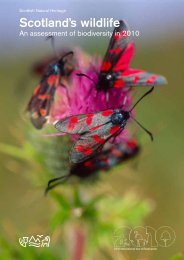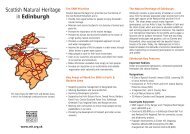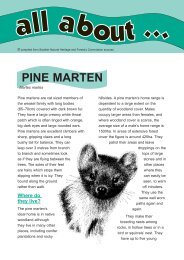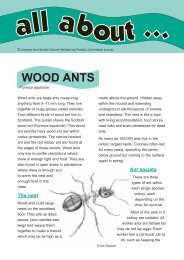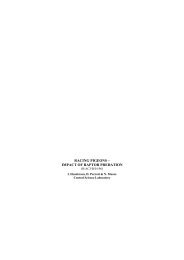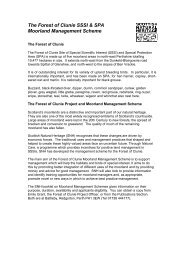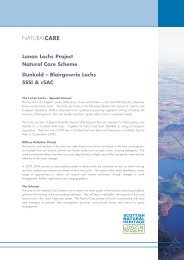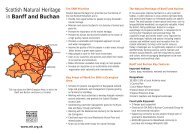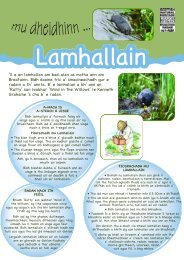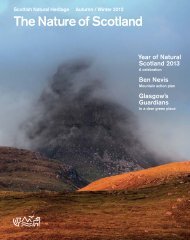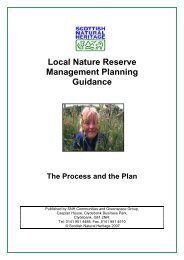Applying wildlife welfare principles to individual animals
Applying wildlife welfare principles to individual animals
Applying wildlife welfare principles to individual animals
You also want an ePaper? Increase the reach of your titles
YUMPU automatically turns print PDFs into web optimized ePapers that Google loves.
potential <strong>welfare</strong> ‘challenge’ through adaptation by changes in its own behaviour (where<br />
environmental challenges exceed the adaptive capacity of the animal or the opportunities<br />
available are inadequate <strong>to</strong> permit the animal effectively <strong>to</strong> express the appropriate adaptive<br />
responses). Negative <strong>welfare</strong>, thus, describes a state that the animal itself perceives as<br />
negative but that still lies within the <strong>animals</strong>’ adaptive capacity.<br />
The adaptive functioning of a group is compromised (‘<strong>welfare</strong> status’ is negative or bad)<br />
when a group of <strong>animals</strong> have insufficient opportunity (freedom) <strong>to</strong> respond appropriately <strong>to</strong><br />
a potential ‘challenge’ through adaptation by changes in behaviour (where environmental<br />
challenges exceed the adaptive capacity of the group as a whole or the opportunities<br />
available are inadequate <strong>to</strong> permit the group effectively <strong>to</strong> express the appropriate adaptive<br />
responses). Negative ‘<strong>welfare</strong>’ at the group level, thus, describes a state in which distinct<br />
<strong>individual</strong>s still may perceive their own state as positive but that does not allow for adaptive<br />
functioning of the group as a whole. In such a situation, it can be expected that the number<br />
of group members experiencing ‘negative <strong>welfare</strong>’ or ‘suffering’ will progressively increase<br />
over time.<br />
Suffering<br />
Suffering describes the negative emotional experience resulting from being exposed <strong>to</strong> a<br />
persisting or extreme negative state of <strong>welfare</strong>. Short-termed, negative <strong>welfare</strong> states such<br />
as suffering from hunger and fear serve as triggers for the animal <strong>to</strong> adapt its behaviour.<br />
They therefore serve a function. A brief state of negative <strong>welfare</strong> may fall within an animal’s<br />
adaptive capacity, and would not necessarily require intervention. If an <strong>individual</strong> lacks the<br />
ability or the opportunity appropriately <strong>to</strong> react <strong>to</strong> suffering (for example, by escaping from a<br />
frightening situation), a challenge is created that may exceed the adaptive capacity of the<br />
<strong>individual</strong>. In such a case, the situation is one of suffering for which intervention is required.<br />
Unavoidable suffering<br />
There may be constraints on intervention that are posed purely by practicalities of<br />
intervention or mitigation. Thus effective intervention in the lives of free-ranging or wild<br />
<strong>animals</strong> may simply not be feasible; in a farm context, if lives<strong>to</strong>ck <strong>animals</strong> are kept outdoors<br />
(which may itself be warranted in terms of promoting positive <strong>welfare</strong> in other respects), they<br />
may be exposed <strong>to</strong> extreme weather that may cause transient suffering. Sudden changes of<br />
weather are neither predictable nor controllable and occasional suffering is unavoidable<br />
when <strong>animals</strong> are kept outdoors.<br />
Necessary suffering<br />
Other constraints may be posed by anthropocentric aims or human convenience, for<br />
example, efficiency of animal production in an agricultural context. In such cases, there may<br />
be mitigation options which are not implemented for reasons of efficiency or economics.<br />
Here, any suffering resulting from non-intervention may be considered avoidable (in theory)<br />
but necessary (because of distinct subjective/<strong>individual</strong> human interests).<br />
Acceptable suffering<br />
The more fundamental question, i.e. whether a distinct human interest and, thus, whether<br />
necessary suffering may be morally acceptable, still needs <strong>to</strong> be answered. Yet this returns<br />
us <strong>to</strong> our third axis of what is or is not acceptable <strong>to</strong> society as a whole, since there may in<br />
practice be a distinction<br />
between what a producer or manager deems necessary or unavoidable and what society as<br />
a whole considers acceptable. Final decisions must therefore be couched within what is the<br />
ethical view of contemporary society. As above, what is acceptable or unacceptable <strong>to</strong><br />
society is inevitably a value judgement or ethical decision.<br />
Welfare issue<br />
47



